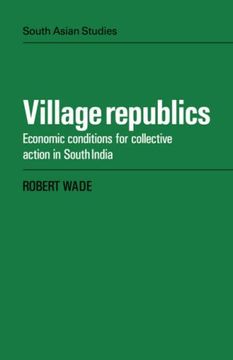Share
Village Republics: Econ Conditions: Economic Conditions for Collective Action in South India (Cambridge South Asian Studies) (in English)
Robert Wade (Author)
·
Cambridge University Press
· Paperback
Village Republics: Econ Conditions: Economic Conditions for Collective Action in South India (Cambridge South Asian Studies) (in English) - Robert Wade
$ 37.57
$ 41.99
You save: $ 4.42
Choose the list to add your product or create one New List
✓ Product added successfully to the Wishlist.
Go to My WishlistsIt will be shipped from our warehouse between
Tuesday, June 11 and
Wednesday, June 12.
You will receive it anywhere in United States between 1 and 3 business days after shipment.
Synopsis "Village Republics: Econ Conditions: Economic Conditions for Collective Action in South India (Cambridge South Asian Studies) (in English)"
Why do some people get together to manage their common assets? Why do other groups of people leave those assets to be over-exploited by each member of the group? The answers could be crucial to the proper maintenance and use of 'common property resources', from grazing land through fish stocks to irrigation water. Robert Wade, drawing on research in areas of Andhra Pradesh where rain is scarce and unreliable, argues that some villagers develop and finance joint institutions for cooperative management of common property resources in grazing and irrigation - but others do not. The main reason lies in the risk of crop loss.Villages located towards the tail-end of irrigation systems, and with soils fertile enough to support a high density of livestock, show a larger amount of corporate organization than villages elsewhere. Placing his work in the wider context of both the developing world today and the open-field system of medieval Europe, the author argues that peasants can under certain conditions organize collectively. Privatization or state regulation are not the only ways of preventing degradation of common property resources in peasant societies.
- 0% (0)
- 0% (0)
- 0% (0)
- 0% (0)
- 0% (0)
All books in our catalog are Original.
The book is written in English.
The binding of this edition is Paperback.
✓ Producto agregado correctamente al carro, Ir a Pagar.

